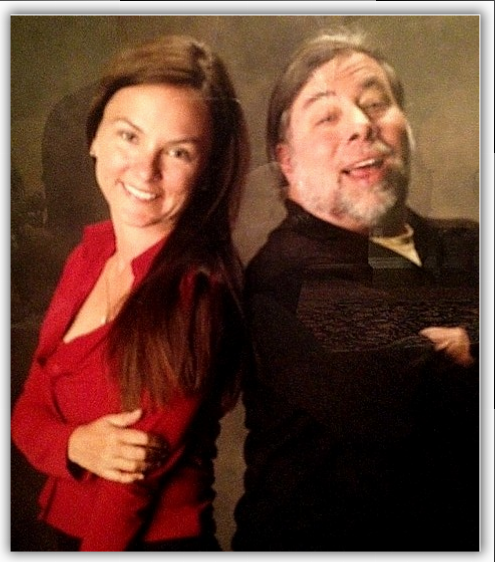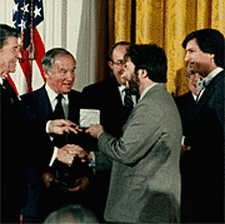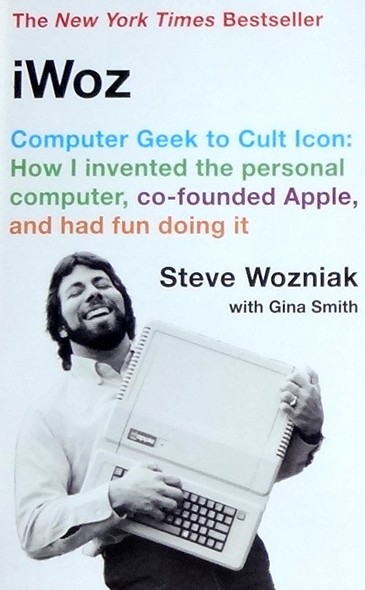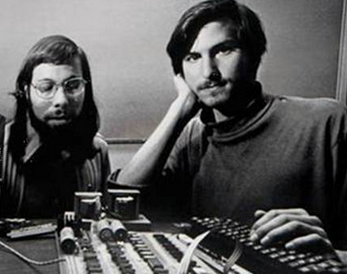 aNewDomain — Apple inventor and co-founder Steve Wozniak is way, way nicer than this namesake in the new “Steve Jobs” movie opening in U.S. theaters this month.
aNewDomain — Apple inventor and co-founder Steve Wozniak is way, way nicer than this namesake in the new “Steve Jobs” movie opening in U.S. theaters this month.
I know this because I spent hundreds of hours with Wozniak in the course of researching and writing his memoir, iWoz: How I Invented the Personal Computer and Had Fun Doing It (WW Norton) back in 2005 and 2006. Far from the argumentative, cussing Wozniak that Seth Rogen portrays in the new movie, the real Wozniak is breezy and easy to get along with, almost to a fault.
If there’s a catch with Steve, it’s his predilection for playing pranks while you’re trying to get work done. Anytime I walked away from the table at The Hick’ry Pit, the Los Gatos barbecue pit where we did most of our interviews, I risked getting salt in my coffee and, sometimes, worse. We don’t need to go there.
So when I asked Wozniak yesterday about what he thought about “Steve Jobs,” I wasn’t surprised at his comments. Wozniak told me he loves the new “Steve Jobs” movie for a lot of reasons — the cinematography, the acting and so on — but Rogen’s Wozniak was quite a bit meaner than Wozniak ever could be.
“I’m just not that confrontational,” Steve told me. “I love the character (Rogen) portrayed. But I never use epithets when I talk to people. And I don’t call people a*-holes.”
 Wozniak totally gets the fact that, even though it’s being billed as a biopic, the “Steve Jobs” movie is still a movie. And in a movie, conflict (not content) is king.
Wozniak totally gets the fact that, even though it’s being billed as a biopic, the “Steve Jobs” movie is still a movie. And in a movie, conflict (not content) is king.
There are elements to the film, which covers Jobs’ life between 1984 and 1999, that just don’t jibe with real life, Wozniak said.
“All through the 15 years of the movie (my character) keeps asking Jobs … to recognize the Apple ][ team. I never did this.”
“One time after a shareholders meeting where the Apple ][ wasn’t mentioned, but was 100 percent of our revenues, all the workers in the Apple ][ division — where I was — (said they) were ready to quit. They were disgusted with the lack of respect. For them, not for myself, I made a 30-second call to (then Apple president John) Sculley on the matter, sort of blaming him. The call was not to Jobs.”
The movie, conversely, has Wozniak angrily calling Jobs and confronting him over favoring the Mac over the firm’s cash cow at the time, the Apple ][, which Wozniak alone invented.
“My call (wasn’t) to Jobs,” Wozniak added. “Jobs was maybe the correct target (to complain to) in hindsight, even if I didn’t know it at the time.”
Aaron Sorkin, who wrote the screenplay, likely “drew out greater parts of this story from Sculley” than he did from Wozniak, who spent many hours talking to Sorkin about the script long before the movie was anywhere near production, Wozniak said.
Some of the story Wozniak told Sorkin made it in the film, Wozniak said. Some did not. “Lots of tiny bits we talked about got painted in different ways … (and) in different places.”
At a San Francisco event just before the film’s release, Sorkin described the film as more “portrait” than “photograph.”
The film, Wozniak says, portrays Jobs and Wozniak as being at odds through most of the 15 years it covers. But the two never had a difficult relationship.
The movie “makes me look like a person (always) confronting Jobs, which I never have done,” Wozniak told me. Throughout much of the film, Wozniak and Jobs are portrayed as rivals in a long, philosophical battle between Wozniak’s revolutionary Apple 11 and the Macintosh, which coupled Jobs’ design aesthetic with revolutionary software from Xerox Park’s labs. That never was the case, Wozniak said.
 Wozniak recognized the potential of the Macintosh back in 1984, as did Sculley, who took Wozniak’s place at the helm after Jobs resigned.
Wozniak recognized the potential of the Macintosh back in 1984, as did Sculley, who took Wozniak’s place at the helm after Jobs resigned.
And yes, Wozniak reminded me, Jobs resigned. That he was thrown out by the board makes for great mythology and a cool movie story, but it never actually happened.
The main difference of opinion was that Sculley, Wozniak and the board wanted to give time for Apple to build the Macintosh market. Back then, all its customers were still buying Apple ][ systems, Wozniak said.
When Apple’s board of directors refused to pay the $800K it would take to create a gorgeous, Orwellian “1984”-themed Apple commercial for the Superbowl, Wozniak said he agreed to split the cost 50-50 with Jobs. “We shared the vision” that now-famous commercial communicated so well, he said. But the movie, for dramatic reasons, pits Wozniak and Jobs against each other on this score.
The movie did a good job in communicating “a lot of greatness and good in Jobs, although it deals a lot with at least one bad thing he did, not recognizing his daughter, Lisa. (Jobs) did dozens or hundreds of things that nobody you know would ever have done. They are not so much a part of this movie as they could have been.”
Still, Wozniak called the new “Steve Jobs” a “great movie that is based on facts,” but one that shifts the facts to make it a great movie. “A lot of what it (portrays) never happened,” he told me, but added that, of course, movie making “is not about reality, it’s about personalities.”
Slick, beautifully produced and entertaining, the movie is something Jobs would’ve been proud of, he added.
“If Steve Jobs were making movies as products, this is the movie he would have wanted to have created,” Wozniak said.
For aNewDomain, I’m Gina Smith.
Here’s the Universal trailer for “Steve Jobs.”
Cover image of Steve Wozniak and Steve Jobs at work in the early 1970s: Margaret Wozniak, All Rights Reserved; image one: Gina Smith and Steve Wozniak back cover photo: “iWoz: How I Invented the Personal Computer and Had Fun Doing It“; image two: Jobs and Wozniak accepting the National Medal of Science from President Ronald Reagan Margaret Wozniak: All Rights Reserved; image four: Cover of the British version of iWoz, Amazon.













